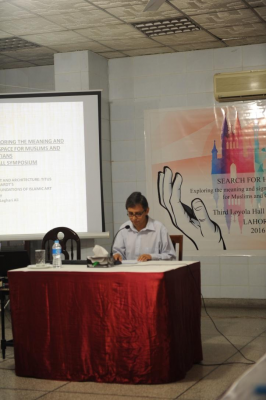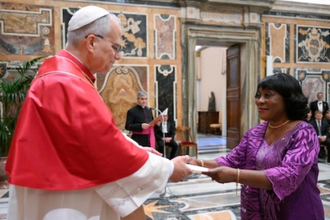Pakistan: New superior of Jesuit Mission

Juan Carlos Pallardel Aparicio SJ
The new head of the Jesuit Mission in Pakistan is Peruvian Juan Carlos Pallardel Aparicio SJ. Ordained in 2013, he has served in Pakistan since 2015. He studied in Peru, Britain (Heythrop College) and France and has worked in France and Chad. Here he responds to questions about his appointment.
Congratulations on being appointed superior of the Jesuit Mission in Pakistan. Tell us something about the history.
The Jesuit Mission in Pakistan has a long history. We can identify three phases of mission in what is now Pakistan territory. The first phase started in 1570 when Jesuits from Goa were invited to the Moghul emperor Akbar's court in Delhi and with him they moved to Lahore. We are talking of Fathers Monserrat and Rudolph Acquaviva. It was an important period that remains in the memory of Muslims in Pakistan and this first phase has helped us to rebuild a presence in the academic sphere of Pakistan.
The second phase of the Jesuits' presence in Pakistan leads us from the southern part of the country, Sindh, to the northern border with Afghanistan, the province of Baluchistan. In 1888 Sindh and Baluchistan was entrusted to the Jesuits, specifically to Jesuits based in Bombay, and they served this vast territory until 1936 when they handed over the mission to the Franciscans and moved back to Bombay. It was a fruitful presence. Next year, St Patrick's Cathedral Parish of Karachi will celebrate 150 years since its founding by the Jesuits.
The third phase started in 1962 when Fathers Schulz, Butler and Schoackaert opened the mission in Lahore trying to make reality the desire of the Archbishop of creating a University College, but it never materialised. Since then the mission has been under the authority of the German Superior Province, then the Australian Province and for recent decades under the Sri Lanka Province. This long history has led the Society to engage in multiple ways: theological reflection, parish work, schools, dialogue, study of Islam and formation of the young and vibrant Pakistani Church.
What are the present apostolic ministries of Jesuits in Pakistan?
The Mission serves in multiple areas to the Church and the country. We run three schools in a poor area of Lahore, and we contribute to the formation of religious and clergy through teaching in the seminaries and sisters' formation programmes. We have a spiritual center (Loyola Hall) where we offer retreats, spiritual direction, counselling, workshops for the spiritual care of people. We also have a youth programme, and of course we continue the work of dialogue and study with Islam at the academic level, re-engaging with Muslim scholars trying to create spaces of encounter and reflection. We do not only serve in Lahore. In recent years we have travelled to different cities and dioceses, providing spiritual care to religious. I should not forget that we run a candidates' house for formation for the Society.
What are the major challenges of the Jesuit Mission in Pakistan? How do you respond to them?
The major challenge is personnel. We are a small team of 4 priests and 2 scholars on studies. The Sri Lanka province has been generous with the mission of sending people - priests and scholars to Pakistan. In addition, there are local vocations that need time to go through the process of formation. Meanwhile, we are working on finding Jesuits to join the Mission; the Sri Lanka Provincial for example is helping in this endeavor. And other ways to answer to this challenge has been inviting Jesuits for short periods of time and concrete activities. This allows us to serve in a better way the local Church; Jesuits from Sri Lanka, Philippines, Britain have answered our call and this has allowed us to provide spiritual care to religious during the summers. I hope this kind of collaboration can continue and grow. This can also make possible continuity and quality that are essential in a country full of challenges.
Christians are a tiny minority among the overwhelming Muslim majority. Does Islamic faith impact Christian faith expressions that could open genuine encounter between the two religions?
I see this in two ways. First, there is a clear impact of the Islamic context in the ways in which the Christian faith is experienced and lived. Using Marshall Hodgson's categories, Christianity grows in an Islamicate context and naturally the impact is there and needs to be studied in a deep way. However, I think there is a second way to answer this question, I think there is a cultural substratum that it is common to Christians and Muslims and that shapes both religious traditions and religious experiences. I consider this too has been little studied. In general, I think there is a serious need for deeper Christian studies in Pakistan.
Though Christian-Muslim Relations underpin all your apostolic involvement in Pakistan, what are your plans for the intellectual dimension of this particular apostolate?
Last December, in Negombo Sri Lanka, four Jesuits of different provinces answered an invitation to create a think-tank for reflecting and formulating a Project for Pakistan on the area of study of Islam and the intellectual apostolate. Fathers Jean-Marc Balham, Victor Edwin, Felix Koerner and Heru Prakosa have helped us to identify a few areas of work for the future and themselves have engaged to collaborate with us in different ways and according to their skills. So, the main idea is to consolidate a "Research Centre" in Lahore in partnership with Jesuits of other provinces, Muslim scholars and members of other religious congregations. This not only for working on dialogue but with a larger vision oriented to contribute to foster the intellectual dimension in the Pakistani Church. For this, since this year and thanks to the Kircher Network, we will start supporting the Major Seminary with visitor professors in order to contribute to theological formation and reflection in Pakistan. I consider there is not only need in the country, there is a kind of thirst at the intellectual level among Christians and Muslims and this is an opportunity for the Society; an opportunity to build bridges among Christians and Muslims, but also to contribute to the intellectual life of Pakistan.
What are your plans for promoting vocations for the Society of Jesus?
For this year, Fr Imran SJ, the first Pakistani Jesuit, and Amir and Asim, our two scholars, are working on a plan for promoting vocations in the country. This is in order to reach young people and more importantly to find ways to support their journey of discernment.
What are the ways in which Jesuits from other parts of the world could contribute to the Pakistan Jesuit Mission?
Perhaps coming to the country for workshops, retreats, for teaching for short period of a couple of weeks or a month. I consider that a small team in place can offer opportunities to (i) form local people for assuming these ministries, (ii) contribute to the growth of the local Church and (iii) consolidate academic spaces of encounter and reflection with Muslims. The team in place can give continuity to the presence of Jesuits and in synergy with other actors can represent a real contribution to Pakistan. I consider the universality of the Society can be expressed in this way also.
Pakistan is a fascinating country, with a diversity of languages, religious heritages, cultures and so on. It has one of the largest Muslim populations in the world. There are many worlds to study, to walk with… a crossroad, a point of encounter of people, of intellectual production and tensions, when richness and fragility go hand by hand… a kind of place, I think, in which the Society must be present.


















